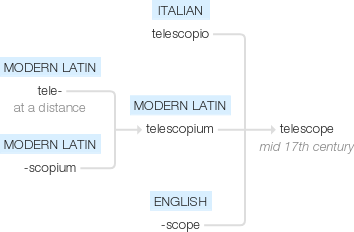Telescope
mid 17th century: from Italian telescopio or modern Latin telescopium, from tele- ‘at a distance’ + -scopium (see -scope).
wiktionary
tele- + -scope. From Latin tēlescopium, from Ancient Greek τηλεσκόπος(tēleskópos, “far-seeing”), from τῆλε(têle, “afar”) + σκοπέω(skopéō, “I look at”).
Coined in 1611 by the Greek mathematician Giovanni Demisiani for one of Galileo Galilei's instruments presented at a banquet at the Accademia dei Lincei. Doublet of Telescopium.
etymonline
telescope (n.)
1640s, from Italian telescopio (Galileo, 1611), and Modern Latin telescopium (Kepler, 1613), both from Greek teleskopos "far-seeing," from tele- "far" (from PIE root *kwel- (2) "far" in space or time) + -skopos "watcher" (from PIE root *spek- "to observe"). Said to have been coined by Prince Cesi, founder and head of the Roman Academy of the Lincei (Galileo was a member). Used in English in Latin form from 1619.
telescope (v.)
"to force together one inside the other" (like the sliding tubes of some telescopes), 1867, from telescope (n.). Related: Telescoped; telescoping.
